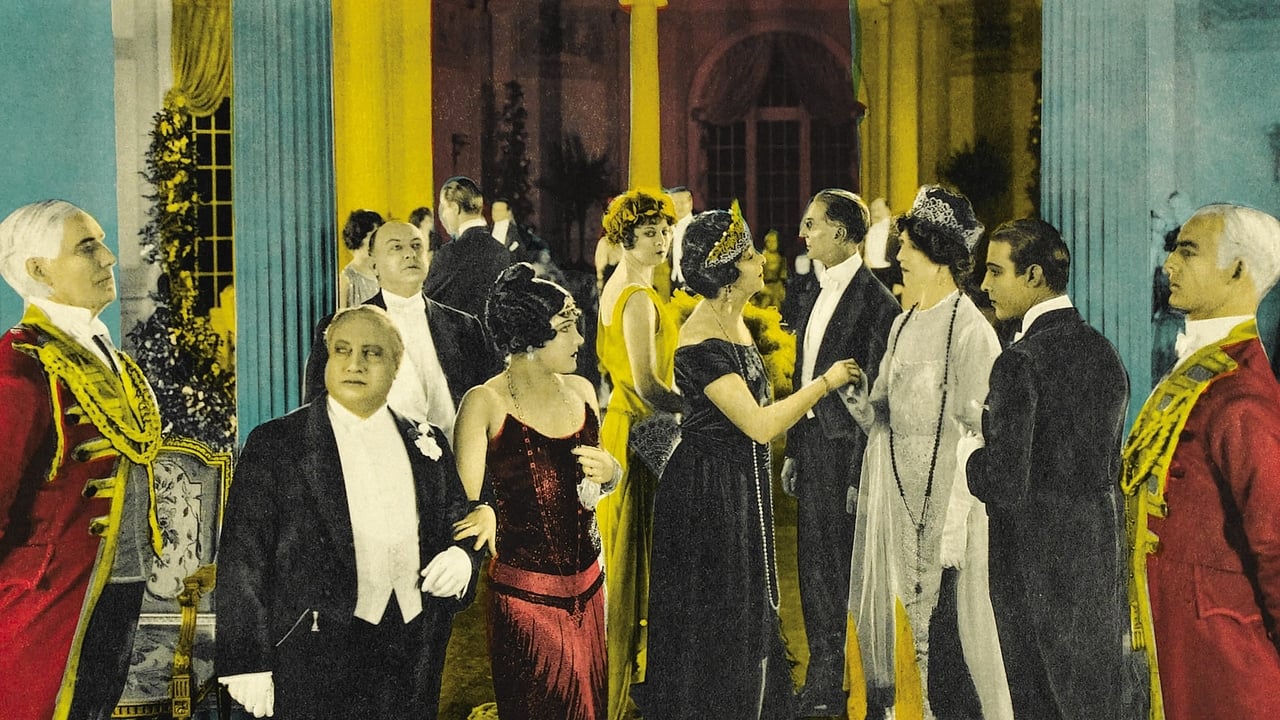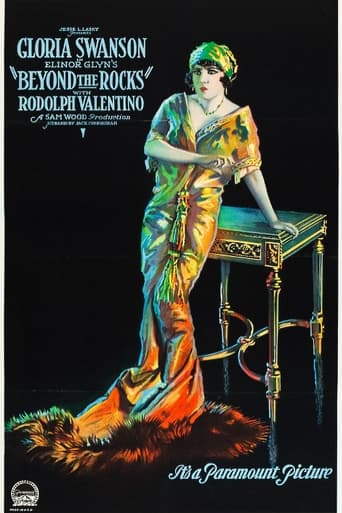

Gloria Swanson looks lovely and young here as Theodora, an ingénue with no money who marries businessman Josiah Brown so she may help her dear father. For the era, the film is remarkably effective, the rice throwing scene as she departs, to go to Europe with her new husband. Even while black and white and digitally restored yet bruised film, the visuals are quite interesting.Rudolph Valentino as Lord Bracondale is quite attractive. It is subtle, he meets her through the Tyrolean honeymoon, the smell of narcissus on her handkerchief reminds him of.....something....Of course all is above board and nothing happens for quite some that is untoward.What is lovely about this film is the visual sense of eroticism and romance. We do not see this today. It is subtle, no screaming, psycho-drama or histrionics. It is, in a sense the way some real romance and infidelity may be played out. Theodora loves Lord Bracondale but remains faithful to elderly and infirm duffer Josiah Brown.Eventually we see Josiah financing a safari to Algeria as he chooses to do so to rid his wife of the stigma of being married to an older, less virile man. He acquires a small legion of Algerian soldiers on an archaeological mission, but there is danger and Theodora decides to follow him.There are some innovative scenes of the Algerian desert and an archaeological site which several explorers note was a "torture site for an unfaithful woman, as from the Bible". It is stark and desolate desert, evoking barren emotions, barren marriage.I found this film charming and visual. Romantic comedies today are saccharine and trite. While some of the cinematography is rudimentary it far surpasses what passes for romantic interlude today.Please watch and Gloria Swanson looks lovely. 8/10.
... View MoreOne of those nice stories to hear about: a film starring two of the most glamorous and true-blue STARS (in caps) of the 1920s was lost for the greater part of the last century and then discovered in a Dutch museum, and then restored for viewing on DVD and TCM. Viewing it any way you can is delightful, but really, if it's at all possible, the best way to watch it is in a theater preferably projected from 35mm with a live piano accompaniment. It is rare to happen but well worth the while, especially with the right organist; the material begs to be given lush and melodramatic rhythm to go with the lush and melodramatic storyline. It might not be the very best silent film you've ever seen, but as far as these old-fashioned romantic will-she-or-wont-she movies go it could be a lot worse.It's one of those stories: a girl needs to betroth a rich gentlemen to help out her family, and she does reluctantly, but her heart is soon to be linked to a man who saves her not once but twice, first time from drowning after falling out of her rowboat and again when she slips and nearly falls off a cliff. There's a few of those moments where one laughs at something kooky being played straight- the honeymoon is spent in the mountain where there's clog-dancing or other- but it's really about these two characters, Lord Bracandale and Theodora, coming together. Moreover, it's about the stars playing would-be lovers on screen, with *the* sexy symbol of his time Valentino substituting for all those lonely women who would love to be in Swanson's shoes. You could guess that so many in the audience would yell out "just leave with him already, he's friggin' Valentino!" Granted, Sam Wood is no master of cinematic drama, but he's a strong craftsman who directs his stars extremely well, getting some restrained and touching performances filled with those little gestures or those sad or loving looks that make up so much of what makes silent films tic. And there's also a supporting performance Robert Bolder that has its moments. Only once did I get slightly fidgety, which is right in the scene where he's deciding on whether or not to go off on the expedition (it dragged slightly, even for just its few minutes as one wants to get back to the stars). The rest of his performance, however, was splendid, particularly when he discovers by a misplaced letter about the love affair between the Lord and Theodora. The final desert scene is also a knockout of melodramatic proportions.It's always something nice when a good film is unearthed for all cineastes to take in, and Beyond the Rocks provides its audience a match-up comparable to the likes of Brad Pitt teaming up with Angelina Jolie or Roberts with Owen in the recent Duplicity. It's engaging to watch the story and yet it's not the reason we're watching: there's something to the chemistry between Swanson, a beauty who doesn't hide her curves and tender but knowing exchanges, and Valentino, who could melt the right girls face with a glance. It's a fine little relic meant to be seen on a big screen.
... View MoreWhile I am a huge classic movie fan, I have had trouble getting into silent films. Beyond The Rocks is the first silent movie that I have watched from beginning to end.I was attracted to this movie because of the stars (Gloria Swanson and Rudolph Valentino) and the fact that this film was lost until just a few years ago.I really enjoyed this movie and found myself quickly drawn into the story. I was even making up dialogue to go along with the story playing out on the screen.This story was a bit melodramatic and the worst of this was Josiah's insanely corny death scene. (When Josiah grasped the hands of Theodora and Hector and then joined them together my eyeballs nearly rolled out of my head.) Despite the melodrama, the story was appealing to me and the sets and costumes were wonderful.I also enjoyed all of the performances. Besides Valentino and Swanson, I was particularly drawn to Alec B. Francis in the role of Theodora's father.My main quibble with this movie (like others have mentioned) is the sound effects in the score. I understand why they put them in (to appeal to modern audiences) but I found them completely distracting. They were unnecessary and took away from the movie.I also found Swanson's make up and costume in some scenes to be distracting. In some scenes she looked much older than Valentino (she was actually a few years younger). Granted, I have not seen a lot of 1920's movies, so this just may be my ignorance showing.All in all, I really enjoyed this movie and plan to seek out other silent films now that I know they can hold my attention.
... View MoreAt this silent point, it is not necessary to explain who were Dame Gloria Swanson and Herr Rudolph Valentino, two silent icons both well known and recognizable for anyone interested in the silent era or even afterwards. Both silent stars worked together in only one film, "Beyond The Rocks" directed by Herr Sam Wood during the silent year of 1922. It was considered lost for many decades until miraculously a nitrate emerged from darkness and was carefully restored by suitable curators at the "Filmmuseum". Obviously the interest in watching such an important silent couple in that film was enormous after so many years, but this German count finds the film's artistic merits noteworthy as well.The words elegance and discretion best describe the tone of the film.It is the story of a larger than life love between Dame Theodora Fitzgerald ( Gloria Swanson ) and Lord Hector Bracondale ( Rudolph Valentino ). Theodora is married to Captain Fitzgerald ( Alec B. Francis ) but it's a matter of economics not love as the match was a way of giving financial support to her family, namely her father and her two older sisters.The passion Lord Hector and Theodora feel for each other is depicted in a well mannered, discreet but at the same time, passionate way; a restricted love that must be suffered in silence in order to avoid a scandal and consequently put at risk the financial support of Dame Fitzgerald's family. This is a hidden love that must wait for better times in order to be consummated.Such restrained passion is due to decency and the social convention that such affairs not be public; after all adultery is a delicate subject for couples from all social classes, not to mention that 80 years ago it was even more complicated to depict adultery on the silent screen due to censorship. Immoral conduct although older than recorded history and practiced for centuries, cannot be justified even in an artistic way according to the censors of that day.So Herr Sam Wood's direction is perfect; he maintains the slow tempo and the frustrations "in crescendo" of such inappropriate love sufferings of the couple. This gives the film the perfect mood, sometimes stilted but at the same time lovely and decadent, helped by the convincing performances of both silent stars, glamorous Dame Swanson and charming Her Valentino.Sometimes, watching the film, this Herr Von was on the verge of losing his temper and said out loud at the Schloss screen: "both of you are young, handsome and rich, so what are you waiting for to commit adultery, for Gott's sake??!!" , a logical aristocratic reaction. Fortunately Dame Fitzgerald and Herr Bracondale knew pretty well that it is much better to suppress basic aristocratic instincts and wait and suffer properly in order to finally get their longed for reward, or as they say in the film, wait until they have "passed the rocks and be finally in the safe waters beyond".And now, if you'll allow me, I must temporarily take my leave because this German Count must drink a cocktail on the rocks.Herr Graf Ferdinand Von Galitzien http://ferdinandvongalitzien.blogspot.com/
... View More